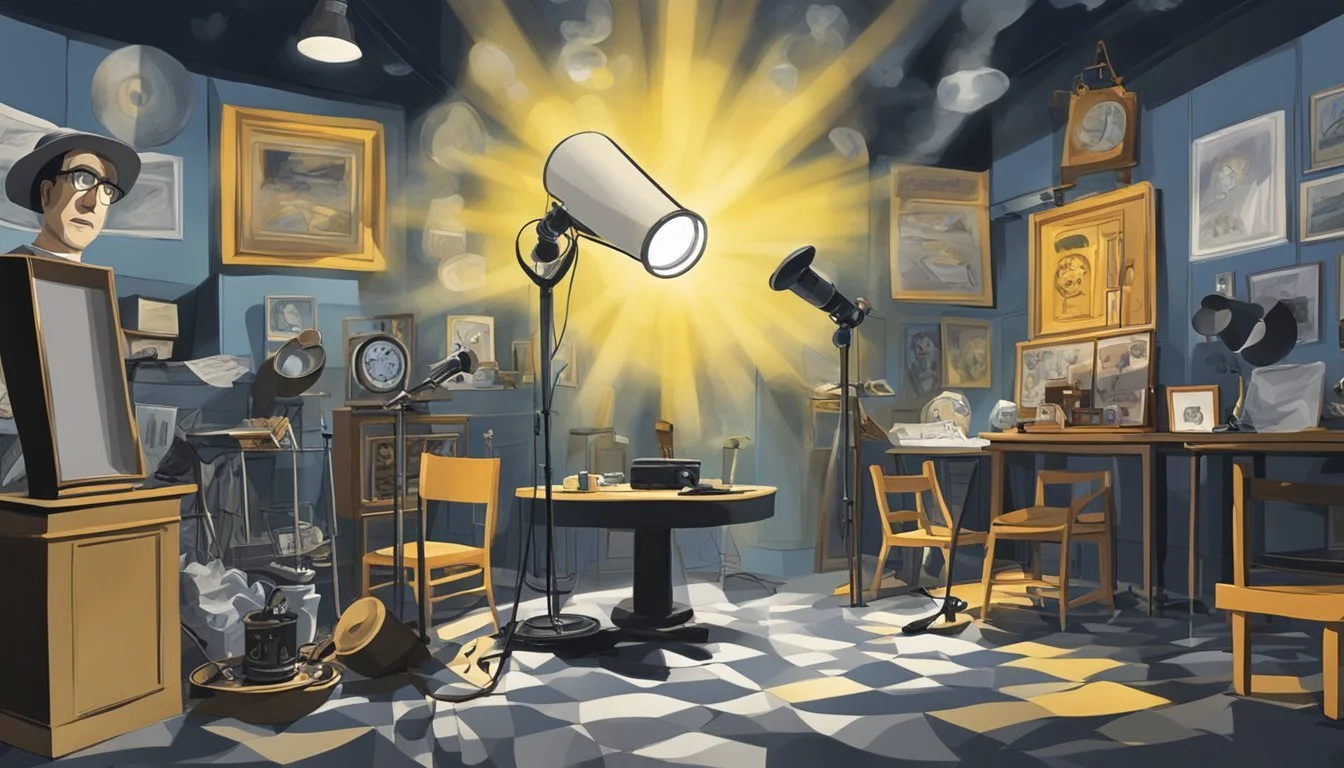Comedy and Crisis: Peter Sellers' Battle with Bipolar Disorder and Depression
The Hidden Struggles of a Comedy Icon
Peter Sellers, one of the most versatile actors of the 20th century, captivated audiences with his comedic genius while privately grappling with severe mental health challenges. Known for iconic roles in films like "The Pink Panther" and "Dr. Strangelove," Sellers' public persona masked a tumultuous inner life marked by bipolar disorder and depression.
Despite his extraordinary talent and success, Sellers struggled with mood swings, erratic behavior, and periods of deep despair throughout his career. His battle with mental illness profoundly impacted his personal relationships and professional life, often leading to conflicts on set and difficulties maintaining long-term partnerships.
Sellers' journey illustrates the complex interplay between creativity and mental health. While his comedic brilliance brought joy to millions, it also served as a coping mechanism for his internal turmoil. This duality shaped his performances and left an indelible mark on the entertainment industry, making him a fascinating subject for exploring the intersection of comedy and crisis in the lives of talented performers.
The Life of Peter Sellers
Peter Sellers was born in 1925 to a family of vaudeville performers in England. As a child, he initially feared the stage but later embraced entertainment.
Sellers began his career in British light entertainment, working in radio and honing his skills as an impressionist. His talent for creating unique comic characters set him apart.
In the 1950s, Sellers transitioned to film, quickly gaining international fame. He starred in acclaimed comedies like "The Pink Panther" series and "Dr. Strangelove."
Despite his professional success, Sellers struggled with personal issues. He had multiple marriages and was known for his complex relationships.
Sellers battled health problems throughout his life. He suffered several heart attacks, with the first occurring in 1964 while filming "Kiss Me, Stupid."
Mental health challenges also plagued the actor. Sellers experienced bouts of depression and exhibited behaviors consistent with bipolar disorder.
His career spanned nearly three decades, during which he became one of the most versatile and celebrated comic actors of his time.
Sellers passed away in 1980 at the Middlesex Hospital in London, leaving behind a legacy of unforgettable performances and characters.
The Height of Fame
Peter Sellers reached the pinnacle of his career with iconic roles and collaborations with celebrated directors. His performances garnered critical acclaim and award recognition.
Iconic Roles and Performances
Sellers' portrayal of Inspector Clouseau in "The Pink Panther" series cemented his status as a comedic genius. His bumbling yet endearing detective became a cultural touchstone.
In "Dr. Strangelove," Sellers showcased his versatility by playing three distinct characters. His performances in this satirical masterpiece are considered some of the finest in cinema history.
"Being There" saw Sellers deliver a nuanced performance as Chance the gardener. This role demonstrated his ability to blend comedy with profound social commentary.
Collaborations with Renowned Directors
Blake Edwards and Sellers formed a prolific partnership. Their work on "The Pink Panther" films defined a new era of physical comedy.
Stanley Kubrick tapped into Sellers' chameleonic talents for "Dr. Strangelove." This collaboration pushed the boundaries of dark comedy and political satire.
Hal Ashby directed Sellers in "Being There," allowing the actor to explore subtler comedic territory. This partnership resulted in one of Sellers' most critically acclaimed performances.
Oscar-Worthy Recognition
Sellers received Academy Award nominations for his work in "Dr. Strangelove" and "Being There." These nods highlighted his ability to transcend pure comedy and deliver performances of dramatic depth.
His role in "Being There" earned him particular praise. Many critics considered it the pinnacle of his career, blending his comedic timing with poignant character study.
Despite never winning an Oscar, Sellers' nominations solidified his reputation as a serious actor capable of delivering award-worthy performances.
The Complexity of Stardom
Peter Sellers' life as a star was marked by extreme highs and lows. His talent and fame were intertwined with personal struggles and relationship challenges.
Mercurial Personality and Relationships
Sellers' volatile nature affected his personal life significantly. His marriages to actresses Britt Ekland and Lynne Frederick were tumultuous, characterized by intense passion and frequent conflicts.
Ekland described Sellers as unpredictable, with his mood swings often dominating their relationship. One moment he could be charming and affectionate, the next distant and irritable.
Sellers' identity seemed to shift constantly, both on and off screen. He often immersed himself so deeply in characters that colleagues found it difficult to distinguish the real Peter Sellers.
Bipolar Disorder and Its Impact
Sellers' behavior patterns aligned with symptoms of bipolar disorder. His manic phases fueled bursts of creativity and energy, enabling him to work tirelessly on multiple projects.
During depressive episodes, Sellers struggled with self-doubt and isolation. These mood swings affected his work, sometimes leading to conflicts on set or sudden withdrawals from productions.
The stress of stardom exacerbated his condition. The pressure to maintain his public image while battling internal turmoil took a toll on his mental health and relationships.
Sellers' reluctance to seek consistent treatment for his bipolar disorder contributed to its ongoing impact on his life and career.
Behind the Camera
Peter Sellers' passion for photography and filmmaking extended beyond his on-screen performances. He explored creative pursuits behind the lens, both as a photographer and aspiring director.
The Making of a Comedy Legend
Sellers honed his comedic skills on BBC Radio's "The Goon Show" in the 1950s. Working alongside Spike Milligan, he developed his gift for character voices and absurdist humor. This experience proved invaluable when transitioning to film and television.
Sellers' keen eye for visual comedy translated well to the camera. He meticulously studied film techniques and timing to enhance his performances. His perfectionism sometimes led to tensions on set, but also resulted in iconic comedic moments.
Directorial Ventures and Partnerships
In 1959, Sellers made his directorial debut with "The Running Jumping & Standing Still Film," a short comedy he co-directed with Richard Lester. The experimental film showcased Sellers' visual comedy style and earned an Oscar nomination.
Sellers collaborated with director Peter Medak on "Ghost in the Noonday Sun" in 1973. The troubled production highlighted Sellers' difficulties working behind the camera on a larger scale. Despite challenges, Sellers continued to explore filmmaking techniques throughout his career.
His interest in photography also flourished. Sellers captured candid moments of fellow celebrities and family members, leaving behind a visual record of his life and times.
Creative Contributions and Legacy
Peter Sellers left an indelible mark on comedy and film through his diverse talents and iconic roles. His influence extended far beyond the silver screen, shaping future generations of performers and entertainers.
Beyond the Screen: A Multidimensional Talent
Sellers' creative genius shone through various mediums. His work on BBC Radio's "The Goon Show" revolutionized comedy with its surreal humor and innovative sound effects. This groundbreaking series laid the foundation for future British comedy.
On film, Sellers achieved international acclaim as Inspector Clouseau in "The Pink Panther" series. His physical comedy and masterful character work defined these films, creating a timeless comedic icon.
Sellers also showcased his musical talents, contributing to hit comedy songs and albums. His versatility extended to dramatic roles, earning him critical praise and award nominations.
Influence on Future Generations
Sellers' impact on comedy continues to resonate. His ability to fully embody characters inspired countless actors and comedians who followed. Many cite him as a major influence on their craft and approach to comedy.
His work in "The Goon Show" helped pave the way for Monty Python and other absurdist comedy groups. The character of Inspector Clouseau remains a touchstone for physical comedy and exaggerated accents in film.
Even posthumously, Sellers' legacy endures. The 2018 documentary "The Ghost of Peter Sellers" explored the troubled production of his film "Ghost in the Noonday Sun," highlighting both his genius and the challenges he faced.
Challenges and Health Struggles
Peter Sellers faced significant physical and mental health issues throughout his life. These struggles profoundly impacted his career and personal relationships.
Battles with Illness
Sellers suffered multiple heart attacks during his lifetime. The first major cardiac event occurred in 1964 while filming "Kiss Me, Stupid." This incident led to the use of amyl nitrite to manage his condition.
Sellers also experienced bouts of depression and mood swings, consistent with bipolar disorder. These mental health challenges affected his work and relationships. He often displayed erratic behavior on film sets and in his personal life.
His physical and mental health issues frequently intersected. The stress of his demanding career likely exacerbated both his heart condition and psychological struggles.
The Turning Points
A severe heart attack in 1977 marked a critical turning point for Sellers. This event forced him to reassess his lifestyle and priorities. He began to focus more on his health and well-being.
Sellers also experienced what some described as a nervous breakdown in the late 1960s. This crisis led him to seek professional help and explore alternative therapies. He became interested in meditation and Eastern philosophies as coping mechanisms.
Despite these efforts, Sellers continued to struggle with his health. His pursuit of the "ultimate orgasm" through risky sexual practices and drug use further complicated his medical conditions.
Final Years and Death
Peter Sellers faced health challenges and career setbacks in his later years, yet continued to work on notable projects until his untimely passing in 1980. His legacy as a comedic genius endures, influencing generations of performers.
Concluding Projects and Performances
Sellers completed his final film "The Fiendish Plot of Dr. Fu Manchu" in 1980. Despite mixed reviews, it showcased his enduring talent for character transformation. He also appeared on "The Muppet Show" in 1978, demonstrating his versatility across different comedic formats.
Health issues plagued Sellers in his final years. He suffered multiple heart attacks, including a near-fatal one in 1964. These experiences reportedly influenced his performance in "Being There" (1979), considered one of his finest roles.
Legacy and Remembrance
Peter Sellers passed away on July 24, 1980, at the Dorchester Hotel in London. He suffered a heart attack and died at the age of 54. His ashes were interred at Golders Green Crematorium.
The 2004 film "The Life and Death of Peter Sellers," starring Geoffrey Rush, explored the complexities of Sellers' life and career. Rush's portrayal earned him critical acclaim and several award nominations.
Sellers' influence on comedy remains significant. His ability to fully inhabit characters and his mastery of accents continue to inspire actors and comedians worldwide. Many of his films, particularly "Dr. Strangelove" and "The Pink Panther" series, are considered classics of comedy cinema.







